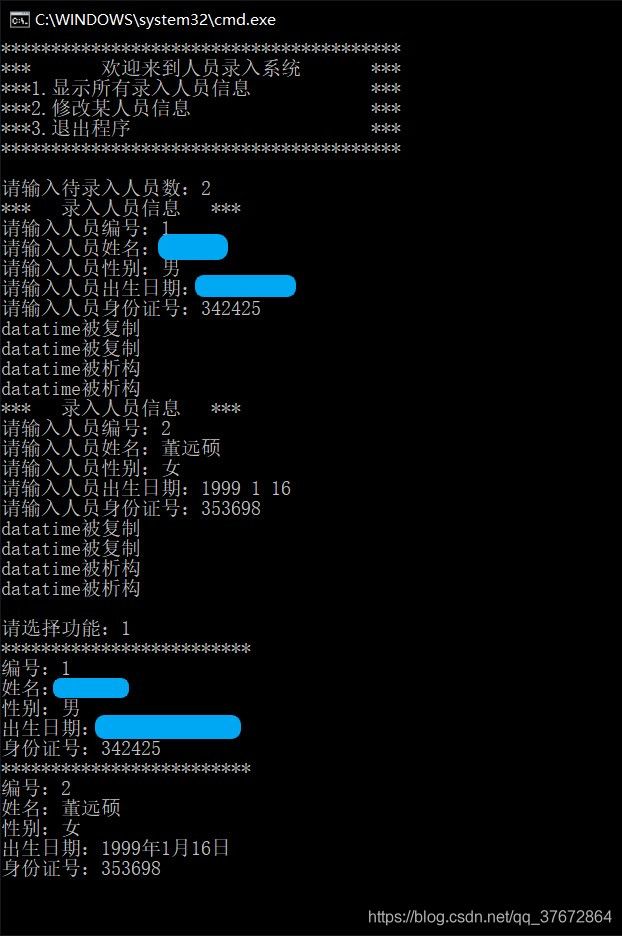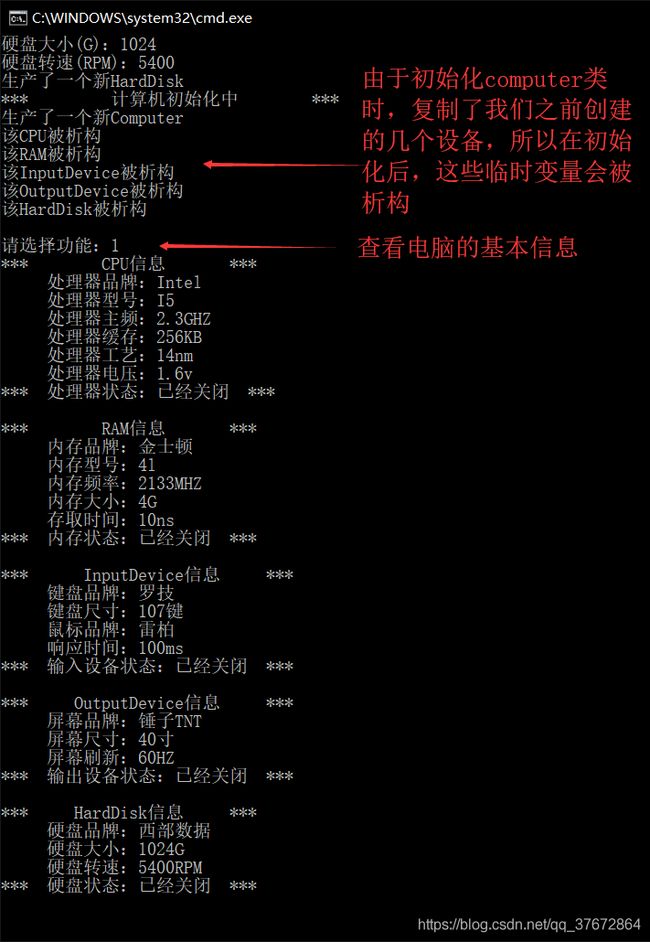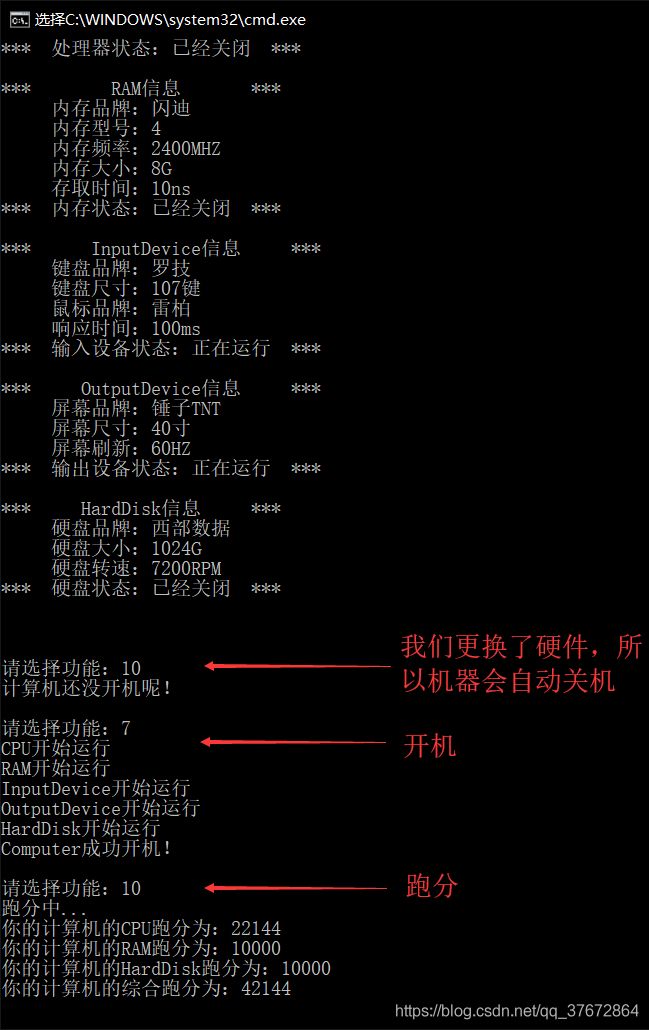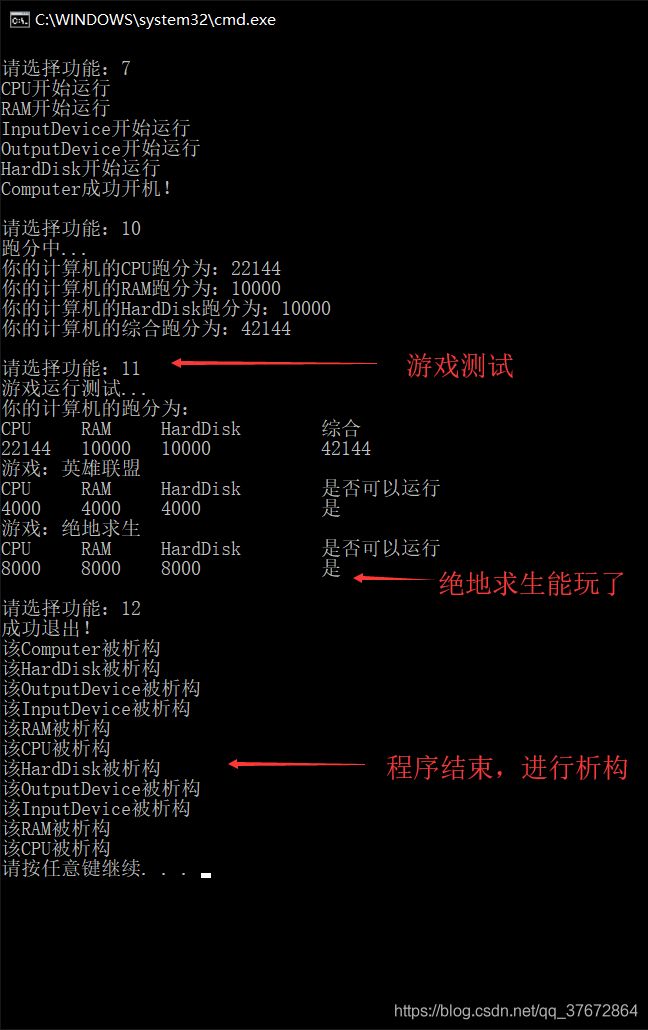C++实验4 用于人事管理的(人员)类、设计Computer类
【实验名称】类和对象(2)
【实验目的】
1、掌握定义对象的方法,理解类和对象的区别;
2、掌握成员函数的实现与调用方法;
3、重点掌握类的组合的使用方法。
【实验原理】
类的组合描述的就是在一个类里内嵌了其他类的对象作为成员的情况,它们之间的关系是一种包含与被包含的关系。简单说,一个类中有若干数据成员是其他类的对象。以前看到的类的数据成员都是基本数据类型的或自定义数据类型的,比如int、float类型的或结构体类型的,现在数据成员也可以是类类型的。
创建组合类的对象:首先创建各个内嵌对象,难点在于构造函数的设计。创建对象时既要对基本类型的成员进行初始化,又要对内嵌对象初始化。
【实验内容】
1. 设计一个用于人事管理的(人员)类。考虑到通用性,这里只抽象出所有类型人员都具有的属性:编号、性别、出生日期、身份证号等。其中“出生日期”声明为一个“日期”类内嵌子对象。用成员函数实现对人员信息的录入和显示。要求包括:构造函数和析构函数、拷贝构造函数、内联成员函数、组合。
代码(详细解释见注释):
#include
#include
using namespace std;
class datatime
{
public:
datatime() {};
datatime(int y = 1900, int m = 1, int d = 1)
{
years = y;
month = m;
day = d;
}
~datatime();
datatime(const datatime &bir);
void show();
private:
int years;
int month;
int day;
};
//析构
datatime::~datatime()
{
cout << "datatime被析构" << endl;
}
//复制构造函数
datatime::datatime(const datatime &bir)
{
years = bir.years;
month = bir.month;
day = bir.day;
cout << "datatime被复制" << endl;
}
void datatime::show()
{
cout << "出生日期:" << years << "年" << month << "月" << day << "日" << endl;
return;
}
class staff
{
public:
staff(int num = 0, string n = "未知", string s = "未知", datatime bir = datatime(1900, 1, 1), string ID = "00000"):birth(bir)
{
number = num;
name = n;
sex = s;
IDcard = ID;
}
void show();
private:
int number;
string name;
string sex;
datatime birth;
string IDcard;
};
void staff::show()
{
cout << "*************************" << endl;
cout << "编号:" << number << endl;
cout << "姓名:" << name << endl;
cout << "性别:" << sex << endl;
birth.show();
cout << "身份证号:" << IDcard << endl;
}
int main()
{
cout << "****************************************" << endl;
cout << "*** 欢迎来到人员录入系统 ***" << endl;
cout << "***1.显示所有录入人员信息 ***" << endl;
cout << "***2.修改某人员信息 ***" << endl;
cout << "***3.退出程序 ***" << endl;
cout << "****************************************\n" << endl;
staff *sta[10];
int ans;
cout << "请输入待录入人员数:";
cin>>ans;
int number;
string name;
string sex;
int years;
int month;
int day;
string IDcard;
for (int i = 0; i < ans; i++)
{
cout << "*** 录入人员信息 ***" << endl;
cout << "请输入人员编号:";
cin >> number;
cout << "请输入人员姓名:";
cin >> name;
cout << "请输入人员性别:";
cin >> sex;
cout << "请输入人员出生日期:";
cin >> years >> month >> day;
datatime MY_datatime(years, month, day);
cout << "请输入人员身份证号:";
cin >> IDcard;
sta[i] = new staff(number, name, sex, MY_datatime, IDcard);
}
int flag;
while (true)
{
cout << "\n请选择功能:";
cin >> flag;
if (flag == 1)
{
for (int i = 0; i < ans; i++)
{
sta[i]->show();
}
cout << endl;
}
else if (flag == 2)
{
int i;
cout << "请输入你要修改第几个人的信息:" << endl;
cin >> i;
i--;
cout << "*** 修改人员信息 ***" << endl;
cout << "请输入人员编号:";
cin >> number;
cout << "请输入人员姓名:";
cin >> name;
cout << "请输入人员性别:";
cin >> sex;
cout << "请输入人员出生日期:";
cin >> years >> month >> day;
datatime MY_datatime(years, month, day);
cout << "请输入人员身份证号:";
cin >> IDcard;
sta[i] = new staff(number, name, sex, MY_datatime, IDcard);
}
else if (flag == 3)
{
//退出
cout << "成功退出!" << endl;
break;
}
}
return 0;
}
运行演示:
2. 设计类Computer,CPU,RAM,InputDevice,OutputDevice,为每个类设计必要的成员变量/成员函数/构造函数等,通过类的组合进行使用,生成Computer的对象并进行操作。
代码(详细解释见注释):
#include
using namespace std;
//CPU类
class CPU
{
public:
CPU() {};
CPU(char b[10], char m[10], double f, int c, int p, double v);
~CPU();
void begin();//运行
void close();//关闭
void show();//显示信息
void upgrade(char b[10], char m[10], double f, int c, int p, double v);//CPU升级
int paofen();//跑分
bool state;//CPU状态
private:
char brand[10];//处理器品牌
char model[10];//处理器型号
double frequency;//主频
int cache;//缓存
int process;//制造工艺
double vcore;//CPU电压
};
CPU::CPU(char b[10], char m[10], double f, int c, int p, double v)
{
strcpy(brand, b);
strcpy(model, m);
frequency = f;
cache = c;
process = p;
vcore = v;
state = 0;
cout << "生产了一个新CPU" << endl;
}
CPU::~CPU()
{
cout << "该CPU被析构" << endl;
}
void CPU::begin()
{
state = 1;
cout << "CPU开始运行" << endl;
}
void CPU::close()
{
state = 0;
cout << "CPU已经关闭" << endl;
}
void CPU::show()
{
cout << "*** CPU信息 ***" << endl;
cout << " 处理器品牌:" << brand << " " << endl;
cout << " 处理器型号:" << model << " " << endl;
cout << " 处理器主频:" << frequency << "GHZ " << endl;
cout << " 处理器缓存:" << cache << "KB " << endl;
cout << " 处理器工艺:" << process << "nm " << endl;
cout << " 处理器电压:" << vcore << "v " << endl;
if (state == 1)
{
cout << "*** 处理器状态:" << "正在运行" << " ***\n" << endl;
}
else
{
cout << "*** 处理器状态:" << "已经关闭" << " ***\n" << endl;
}
}
void CPU::upgrade(char b[10], char m[10], double f, int c, int p, double v)
{
strcpy(brand, b);
strcpy(model, m);
frequency = f;
cache = c;
process = p;
vcore = v;
state = 0;
cout << "CPU升级完成" << endl;
}
int CPU::paofen()
{
double temp = frequency * vcore*cache / process;
temp = temp / (3 * 2 * 256 / 14) * 10000.0;
return temp;
}
//RAM类
class RAM
{
public:
RAM() {};
RAM(char b[10], char m[10], int s, int t);
~RAM();
void begin();
void close();
void show();
void judge_frequency();
void upgrade(char b[10], char m[10], int s, int t);//RAM升级
int paofen();
bool state;//RAM状态
private:
char brand[10];//品牌
char model[10];//内存型号
int size;//大小
int frequency;//频率
int time;//存取时间
};
RAM::RAM(char b[10], char m[10], int s, int t)
{
strcpy(brand, b);
strcpy(model, m);
size = s;
time = t;
judge_frequency();
state = 0;
cout << "生产了一个新RAM" << endl;
}
RAM::~RAM()
{
cout << "该RAM被析构" << endl;
}
void RAM::begin()
{
state = 1;
cout << "RAM开始运行" << endl;
}
void RAM::close()
{
state = 0;
cout << "RAM已经关闭" << endl;
}
void RAM::show()
{
cout << "*** RAM信息 ***" << endl;
cout << " 内存品牌:" << brand << " " << endl;
cout << " 内存型号:" << model << " " << endl;
cout << " 内存频率:" << frequency << "MHZ " << endl;
cout << " 内存大小:" << size << "G " << endl;
cout << " 存取时间:" << time << "ns " << endl;
if (state == 1)
{
cout << "*** 内存状态:" << "正在运行" << " ***\n" << endl;
}
else
{
cout << "*** 内存状态:" << "已经关闭" << " ***\n" << endl;
}
}
void RAM::judge_frequency()
{
if (model[0] == '1')
{
frequency = 400;
}
else if (model[0] == '2')
{
frequency = 800;
}
else if (model[0] == '3')
{
if(model[1] == 'l'|| model[1] == 'L')
frequency = 1333;
else
frequency = 1600;
}
else
{
if (model[1] == 'l' || model[1] == 'L')
frequency = 2133;
else
frequency = 2400;
}
}
void RAM::upgrade(char b[10], char m[10], int s, int t)
{
strcpy(brand, b);
strcpy(model, m);
size = s;
time = t;
judge_frequency();
state = 0;
cout << "RAM升级完成" << endl;
}
int RAM::paofen()
{
double temp = frequency * size / time;
temp = temp / (2400 * 8 / 10) * 10000.0;
return temp;
}
//输入设备类
class InputDevice
{
public:
InputDevice() {};
InputDevice(char b1[10], char b2[10], int s, int t);
~InputDevice();
void begin();
void close();
void show();
void upgrade(char b1[10], char b2[10], int s, int t);//InputDevice升级
bool state;//输入设备状态
private:
char brand1[10];//键盘品牌
int size;//键盘尺寸
char brand2[10];//鼠标品牌
int time;//鼠标响应时间
};
InputDevice::InputDevice(char b1[10], char b2[10], int s, int t)
{
strcpy(brand1, b1);
strcpy(brand2, b2);
size = s;
time = t;
state = 0;
cout << "生产了一个新InputDevice" << endl;
}
InputDevice::~InputDevice()
{
cout << "该InputDevice被析构" << endl;
}
void InputDevice::begin()
{
state = 1;
cout << "InputDevice开始运行" << endl;
}
void InputDevice::close()
{
state = 0;
cout << "InputDevice已经关闭" << endl;
}
void InputDevice::show()
{
cout << "*** InputDevice信息 ***" << endl;
cout << " 键盘品牌:" << brand1 << " " << endl;
cout << " 键盘尺寸:" << size << "键 " << endl;
cout << " 鼠标品牌:" << brand2 << " " << endl;
cout << " 响应时间:" << time << "ms " << endl;
if (state == 1)
{
cout << "*** 输入设备状态:" << "正在运行" << " ***\n" << endl;
}
else
{
cout << "*** 输入设备状态:" << "已经关闭" << " ***\n" << endl;
}
}
void InputDevice::upgrade(char b1[10], char b2[10], int s, int t)
{
strcpy(brand1, b1);
strcpy(brand2, b2);
size = s;
time = t;
state = 0;
cout << "InputDevice升级完成" << endl;
}
//输出设备类
class OutputDevice
{
public:
OutputDevice() {};
OutputDevice(char b[10], int s, int f);
~OutputDevice();
void begin();
void close();
void show();
void upgrade(char b[10], int s, int f);//InputDevice升级
bool state;//输出设备状态
private:
char brand[10];//显示屏品牌
int size;//显示屏尺寸
int frequency;//显示屏刷新频率
};
OutputDevice::OutputDevice(char b[10], int s, int f)
{
strcpy(brand, b);
size = s;
frequency = f;
state = 0;
cout << "生产了一个新OutputDevice" << endl;
}
OutputDevice::~OutputDevice()
{
cout << "该OutputDevice被析构" << endl;
}
void OutputDevice::begin()
{
state = 1;
cout << "OutputDevice开始运行" << endl;
}
void OutputDevice::close()
{
state = 0;
cout << "OutputDevice已经关闭" << endl;
}
void OutputDevice::show()
{
cout << "*** OutputDevice信息 ***" << endl;
cout << " 屏幕品牌:" << brand << " " << endl;
cout << " 屏幕尺寸:" << size << "寸 " << endl;
cout << " 屏幕刷新:" << frequency << "HZ " << endl;
if (state == 1)
{
cout << "*** 输出设备状态:" << "正在运行" << " ***\n" << endl;
}
else
{
cout << "*** 输出设备状态:" << "已经关闭" << " ***\n" << endl;
}
}
void OutputDevice::upgrade(char b[10], int s, int f)
{
strcpy(brand, b);
size = s;
frequency = f;
state = 0;
cout << "OutputDevice升级完成" << endl;
}
//硬盘类
class HardDisk
{
public:
HardDisk() {};
HardDisk(char b[10], int si, int sp);
~HardDisk();
void begin();
void close();
void show();
void upgrade(char b[10], int si, int sp);//InputDevice升级
int paofen();
bool state;//输出设备状态
private:
char brand[10];//硬盘品牌
int size;//硬盘大小
int speed;//硬盘转速
};
HardDisk::HardDisk(char b[10], int si, int sp)
{
strcpy(brand, b);
size = si;
speed = sp;
state = 0;
cout << "生产了一个新HardDisk" << endl;
}
HardDisk::~HardDisk()
{
cout << "该HardDisk被析构" << endl;
}
void HardDisk::begin()
{
state = 1;
cout << "HardDisk开始运行" << endl;
}
void HardDisk::close()
{
state = 0;
cout << "HardDisk已经关闭" << endl;
}
void HardDisk::show()
{
cout << "*** HardDisk信息 ***" << endl;
cout << " 硬盘品牌:" << brand << " " << endl;
cout << " 硬盘大小:" << size << "G " << endl;
cout << " 硬盘转速:" << speed << "RPM " << endl;
if (state == 1)
{
cout << "*** 硬盘状态:" << "正在运行" << " ***\n" << endl;
}
else
{
cout << "*** 硬盘状态:" << "已经关闭" << " ***\n" << endl;
}
}
void HardDisk::upgrade(char b[10], int si, int sp)
{
strcpy(brand, b);
size = si;
speed = sp;
state = 0;
cout << "HardDisk升级完成" << endl;
}
int HardDisk::paofen()
{
double temp = size * speed;
temp = temp / (1024 * 7200) * 10000.0;
return temp;
}
//计算机类
class Computer
{
public:
Computer() {};
Computer(CPU My_C, RAM My_R, InputDevice My_I, OutputDevice My_O, HardDisk My_H);
~Computer();
void begin();//开机
void close();//关机
void show();//显示计算机所有设备信息
void upgrade();//Computer升级
void add();//计算机加法
void paofen();//跑分
void judge();//游戏运行测试
CPU My_CPU;
RAM My_RAM;
InputDevice My_InputDevice;
OutputDevice My_OutputDevice;
HardDisk My_HardDisk;
};
Computer::Computer(CPU My_C, RAM My_R, InputDevice My_I, OutputDevice My_O, HardDisk My_H) :My_CPU(My_C), My_RAM(My_R), My_InputDevice(My_I), My_OutputDevice(My_O), My_HardDisk(My_H)
{
cout << "生产了一个新Computer" << endl;
}
Computer::~Computer()
{
cout << "该Computer被析构" << endl;
}
void Computer::begin()
{
My_CPU.begin();
My_RAM.begin();
My_InputDevice.begin();
My_OutputDevice.begin();
My_HardDisk.begin();
cout << "Computer成功开机!" << endl;
}
void Computer::close()
{
My_CPU.close();
My_RAM.close();
My_InputDevice.close();
My_OutputDevice.close();
My_HardDisk.close();
cout << "Computer已经关闭!" << endl;
}
void Computer::show()
{
My_CPU.show();
My_RAM.show();
My_InputDevice.show();
My_OutputDevice.show();
My_HardDisk.show();
cout << endl;
}
void Computer::upgrade()
{
cout << "重新组装中..." << endl;
cout << "Computer升级完成" << endl;
}
void Computer::add()
{
if (My_CPU.state&&My_RAM.state&&My_InputDevice.state&&My_OutputDevice.state&&My_HardDisk.state)
{
int a, b;
cout << "请输入要计算的两个数:" << endl;
cin >> a >> b;
cout << "加法结果:" << a + b << endl;
}
else
{
cout << "计算机还没开机呢!" << endl;
}
}
void Computer::paofen()
{
if (My_CPU.state&&My_RAM.state&&My_InputDevice.state&&My_OutputDevice.state&&My_HardDisk.state)
{
cout << "跑分中..." << endl;
int num[5];
num[0] = My_CPU.paofen();
num[1] = My_RAM.paofen();
num[2] = My_HardDisk.paofen();
cout << "你的计算机的CPU跑分为:" << num[0] << endl;
cout << "你的计算机的RAM跑分为:" << num[1] << endl;
cout << "你的计算机的HardDisk跑分为:" << num[2] << endl;
cout << "你的计算机的综合跑分为:" << num[0] + num[1] + num[2] << endl;
}
else
{
cout << "计算机还没开机呢!" << endl;
}
}
void Computer::judge()
{
if (My_CPU.state&&My_RAM.state&&My_InputDevice.state&&My_OutputDevice.state&&My_HardDisk.state)
{
cout << "游戏运行测试..." << endl;
int num[5];
num[0] = My_CPU.paofen();
num[1] = My_RAM.paofen();
num[2] = My_HardDisk.paofen();
cout << "你的计算机的跑分为:" << endl;
cout << "CPU\tRAM\tHardDisk\t综合" << endl;
cout << num[0] << "\t" << num[1] << "\t" << num[2] << "\t\t" << num[0] + num[1] + num[2] << endl;
cout << "游戏:英雄联盟" << endl;
cout << "CPU\tRAM\tHardDisk\t是否可以运行" << endl;
if (num[0] >= 4000 && num[1] >= 4000 && num[2] >= 4000)
cout << "4000\t" << "4000\t" << "4000\t\t" << "是" << endl;
else
cout << "4000\t" << "4000\t" << "4000\t\t" << "否" << endl;
cout << "游戏:绝地求生" << endl;
cout << "CPU\tRAM\tHardDisk\t是否可以运行" << endl;
if (num[0] >= 8000 && num[1] >= 8000 && num[2] >= 8000)
cout << "8000\t" << "8000\t" << "8000\t\t" << "是" << endl;
else
cout << "8000\t" << "8000\t" << "8000\t\t" << "否" << endl;
}
else
{
cout << "计算机还没开机呢!" << endl;
}
}
int main()
{
//freopen("in.txt", "r", stdin);
cout << "************************************" << endl;
cout << "*** 欢迎来到计算机组装厂 ***" << endl;
cout << "*** 1.计算机信息显示 ***" << endl;
cout << "*** 2.CPU升级 ***" << endl;
cout << "*** 3.RAM升级 ***" << endl;
cout << "*** 4.InputDevice升级 ***" << endl;
cout << "*** 5.OutputDevice升级 ***" << endl;
cout << "*** 6.HardDisk升级 ***" << endl;
cout << "*** 7.计算机开机 ***" << endl;
cout << "*** 8.计算机关机 ***" << endl;
cout << "*** 9.计算机加法 ***" << endl;
cout << "*** 10.跑分 ***" << endl;
cout << "*** 11.游戏运行测试 ***" << endl;
cout << "*** 12.退出组装厂 ***" << endl;
cout << "************************************\n" << endl;
cout << "着手开始设计你的第一台计算机吧!" << endl;
char brand[10];//品牌
char model[10];//型号
double frequency;//主频
int cache;//缓存
int process;//制造工艺
double vcore;//CPU电压
cout << "*** 创造CPU ***" << endl;
cout << "处理器品牌:";
cin >> brand;
cout << "处理器型号:";
cin >> model;
cout << "处理器主频(GHZ):";
cin >> frequency;
cout << "处理器缓存(KB):";
cin >> cache;
cout << "处理器工艺(NM):";
cin >> process;
cout << "处理器电压(V):";
cin >> vcore;
CPU MY_CPU(brand, model, frequency, cache, process, vcore);
//输入
int size;//大小
int time;//存取时间
cout << "*** 创造RAM ***" << endl;
cout << "内存品牌:";
cin >> brand;
cout << "内存型号:DDR";
cin >> model;
cout << "内存频率自动判断中..." << endl;
cout << "内存大小(G):";
cin >> size;
cout << "存取时间(NM):";
cin >> time;
RAM MY_RAM(brand, model, size, time);
char brand1[10];//品牌
char brand2[10];//品牌
cout << "*** 创造InputDevice ***" << endl;
cout << "键盘品牌:";
cin >> brand1;
cout << "键盘尺寸(键):";
cin >> size;
cout << "鼠标品牌:";
cin >> brand2;
cout << "响应时间(MS):";
cin >> time;
InputDevice MY_InputDevice(brand1, brand2, size, time);
cout << "*** 创造OutputDevice ***" << endl;
cout << "屏幕品牌:";
cin >> brand;
cout << "屏幕尺寸(寸):";
cin >> size;
cout << "屏幕刷新(HZ):";
cin >> frequency;
OutputDevice MY_OutputDevice(brand, size, frequency);
int speed;//转速
cout << "*** 创造HardDisk ***" << endl;
cout << "硬盘品牌:";
cin >> brand;
cout << "硬盘大小(G):";
cin >> size;
cout << "硬盘转速(RPM):";
cin >> speed;
HardDisk MY_HardDisk(brand, size, speed);
cout << "*** 计算机初始化中 ***" << endl;
Computer MY_Computer(MY_CPU, MY_RAM, MY_InputDevice, MY_OutputDevice, MY_HardDisk);
int flag;
while (true)
{
cout << "\n请选择功能:";
cin >> flag;
if (flag == 1)
{
//计算机信息显示
MY_Computer.show();
}
else if (flag == 2)
{
//升级CPU
cout << "*** 升级CPU ***" << endl;
cout << "处理器品牌:";
cin >> brand;
cout << "处理器型号:";
cin >> model;
cout << "处理器主频(GHZ):";
cin >> frequency;
cout << "处理器缓存(KB):";
cin >> cache;
cout << "处理器工艺(NM):";
cin >> process;
cout << "处理器电压(V):";
cin >> vcore;
MY_Computer.My_CPU.upgrade(brand, model, frequency, cache, process, vcore);
}
else if (flag == 3)
{
//升级RAM
cout << "*** 升级RAM ***" << endl;
cout << "内存品牌:";
cin >> brand;
cout << "内存型号:";
cin >> model;
cout << "内存频率自动判断中..." << endl;
cout << "内存大小(G):";
cin >> size;
cout << "存取时间(NM):";
cin >> time;
MY_Computer.My_RAM.upgrade(brand, model, size, time);
}
else if (flag == 4)
{
//升级InputDevice
cout << "*** 升级InputDevice ***" << endl;
cout << "键盘品牌:";
cin >> brand1;
cout << "键盘尺寸(键):";
cin >> size;
cout << "鼠标品牌:";
cin >> brand2;
cout << "响应时间(MS):";
cin >> time;
MY_Computer.My_InputDevice.upgrade(brand1, brand2, size, time);
}
else if (flag == 5)
{
//升级OutputDevice
cout << "*** 升级OutputDevice ***" << endl;
cout << "屏幕品牌:";
cin >> brand;
cout << "屏幕尺寸(寸):";
cin >> size;
cout << "屏幕刷新(HZ):";
cin >> frequency;
MY_Computer.My_OutputDevice.upgrade(brand, size, frequency);
}
else if (flag == 6)
{
//升级HardDisk
cout << "*** 升级HardDisk ***" << endl;
cout << "硬盘品牌:";
cin >> brand;
cout << "硬盘大小(G):";
cin >> size;
cout << "硬盘转速(RPM):";
cin >> speed;
MY_Computer.My_HardDisk.upgrade(brand, size, speed);
}
else if (flag == 7)
{
//开机
MY_Computer.begin();
}
else if (flag == 8)
{
//关机
MY_Computer.close();
}
else if (flag == 9)
{
//计算机加法
MY_Computer.add();
}
else if (flag == 10)
{
//跑分
MY_Computer.paofen();
}
else if (flag == 11)
{
//游戏运行测试
MY_Computer.judge();
}
else if (flag == 12)
{
//退出
cout << "成功退出!" << endl;
break;
}
}
return 0;
}
运行演示:
【小结或讨论】
这次实验,要说难度的话,并不是很难,主要就是组合类的使用,详细看一下书,上网查一查用法就知道了。但是由于第二题还是自由发挥的题目,所以就可以做的非常复杂。
第二题我写的代码很长,这次一共写了快1000行代码,其中第二题占了近800行。但我觉得这样是不好的,没有意义。其实我觉得自己的想法并不是很复杂,除了一些基本的初始化、修改信息、开机、关机,我自己主要加进去的就是跑分和游戏运行测试功能,跑分的结果结合了已经输入的一些硬件参数(如CPU主频、内存大小、硬盘转速等等),这也是我觉得有意思的地方。不够没有想到写得也比较累。







